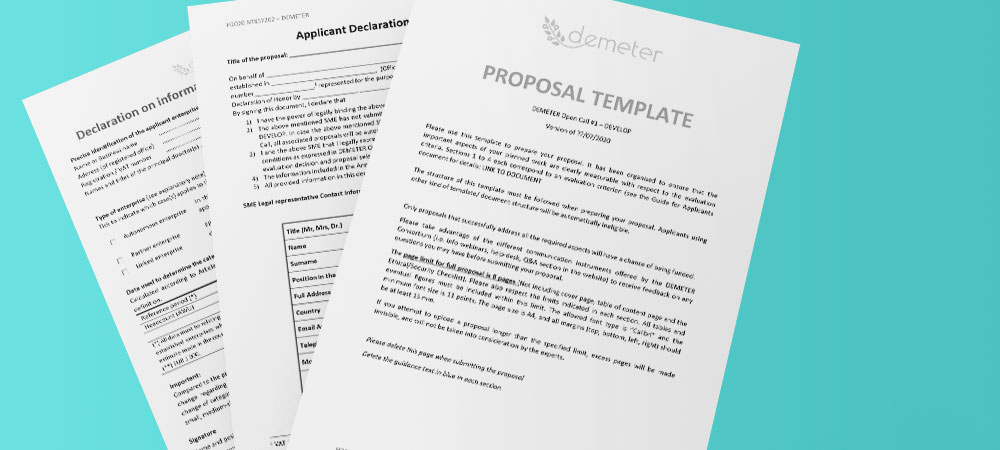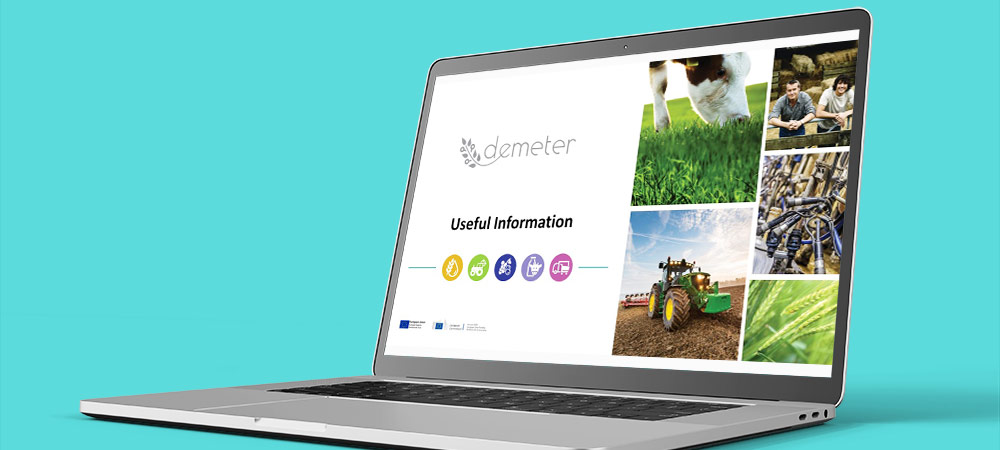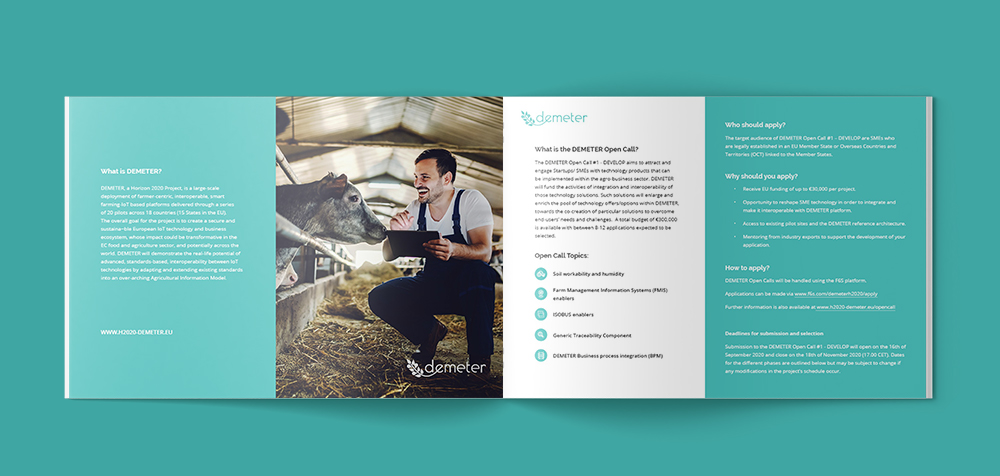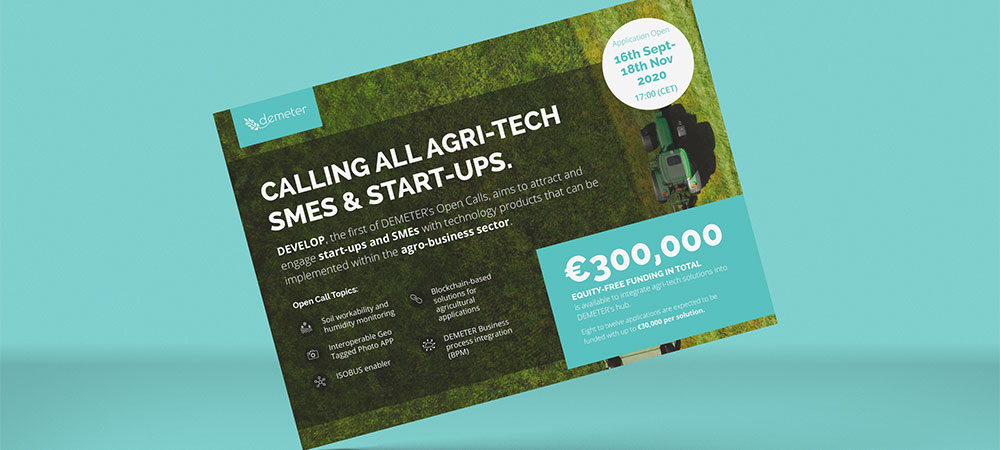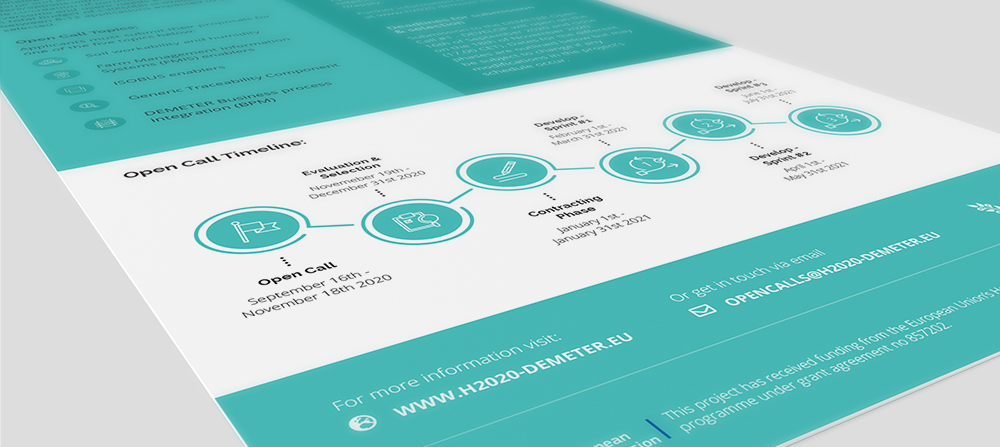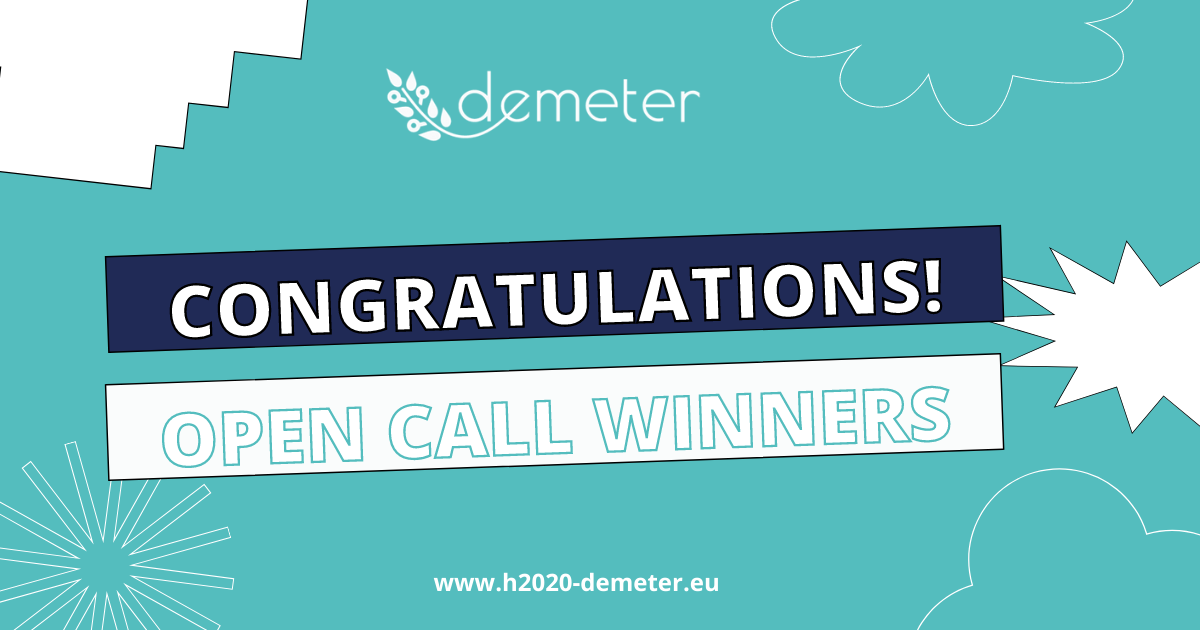
Open Call Open Call #1 - DEVELOP
Aims to attract and engage Startups/ SMEs with technology products that can be implemented within the agro-business sector.
- Open Call Winners
- About the Open Call
- TOPIC 1: Soil workability and humidity monitoring
- TOPIC 2: Interoperable Geo Tagged Photo APP
- TOPIC 3: ISOBUS enabler
- TOPIC 4: Blockchain-based solutions for agricultural applications
- TOPIC 5: DEMETER Business process integration (BPM).
- Eligibility Criteria & Application
- Resources & Downloads
- Webinars
- FAQ
Open Call #1, DEVELOP
Open Call #1, DEVELOP, aimed to attract and engage startups and SMEs with technology products that can be implemented within the agro-business sector. Five specific challenges were addressed by the Open Call.
In total, 61 applications were received from 21 countries. Following a review of the proposals, we are delighted to announce the winners as:
![]()
WAISENSE FIELDS
Multilevel and multiplatform solution for water/humidity control and monitoring.
Metrica6 creates a cyberphysical solution for water efficiency in green spaces applied to the smart city and smart agro environments.
![]()
SOILY
Addressing Topic 1: Soil Workability and Humidity Monitoring.
Soil moisture monitoring.
Providing and integrating easy-to-use soil moisture sensors to improve workability of soil and reduce irrigation costs

SOILSIGNAL
Addressing Topic 1: Soil Workability and Humidity Monitoring.
Predicting soil moisture for soil workability.
Innovative decision management tool using Earth Observation satellite data, IOT sensors and machine learning/AI to detect and predict soil moisture and provide recommendations to farmers ahead of time.
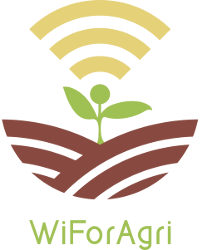
W4A-SOILWORKABILITY
Addressing Topic 1: Soil Workability and Humidity Monitoring.
WiForAgri-DSS-SOIL-WORKABILITY
WiForAgri SOIL-WORKABILITY DSS is a suite of modelling tools developed as Web-Services and offered to final users as SaaS.
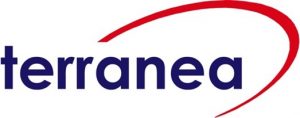
CAP/P
Addressing Topic 2: Interoperable Geo Tagged Photo App.
Supporting the monitoring needs of the Common Agricultural Policy (CAP) through a geo-tagged photo App.
The objective of the CAP/P project is to develop a mobile application allowing farmers to take geo-tagged field photos including specific meta-data to document their activities linked to certain management practices.
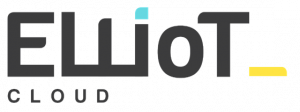
ELLIOT – ISOBUS
Addressing Topic 3: Isobus Enabler.
ONE STEP FORWARD FOR THE DIGITALIZATION IN THE AGRICULTURE SECTOR.
Creation of a gateway software component using the ISOBUS plug-in complement.

PERSEPHONE
Addressing Topic 4: Blockchain-based solutions for agricultural applications.
Permissioned SeedsBit Traceability Platform Integration from Field to HoReCa with Ontology Extension.
PerSePHOnE is a system that guarantees the quality and validity of data and integrates DEMETER providing a clear track of events together with the reason why they occurred, includes tracking and tracing abilities for products and transformation processes.
![]()
COLLECTGOOD
Addressing Topic 5: DEMETER Business Process Integration.
Daily and Fresh Goods Collection Operations Management Module Development.
CollectGood will aim to solve disadvantages of conventional operation planning of fresh goods collection processes with sustainability and efficiency aspects for filling the gaps between farms and agricultural cooperatives and/or producers.
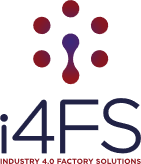
DEBBIE
Addressing Topic 5: DEMETER Business Process Integration.
DEBBIE Business Process Management Tool.
DEBBIE integrates a BPM tool with a visual analytics component into farm management activities.
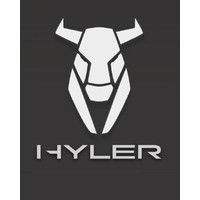
OPTIFLAXIT
Addressing Topic 5: DEMETER Business Process Integration.
Optimal Flax Machine Integration Business Process.
Future proof data exchange during flax harvesting towards Industry.
Open Call #1 - DEVELOP
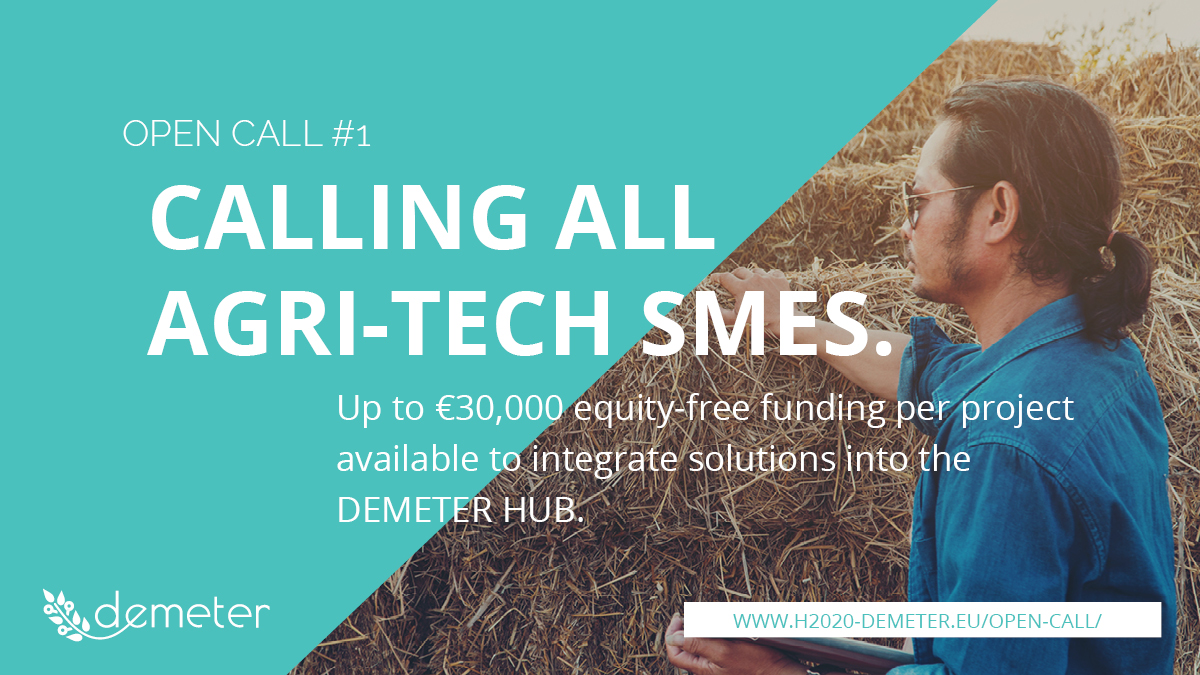
About the Open Call
Calling all Agri-tech SMEs.
Up to €30,000 equity-free funding per selected project available to integrate agri-tech solutions into DEMETER’s HUB.
The DEMETER Open Call #1 – DEVELOP aims to attract and engage startups/ SMEs with technology products that can be implemented within the agro-business sector. DEMETER will fund the integration and interoperability activities of these technology solutions. Such solutions will enlarge and enrich the pool of technology offers/options within DEMETER, towards the co-creation of particular solutions to overcome end-users’ needs and challenges. A total budget of €300,000 is available with 8-12 applications expected to be selected.
The DEMETER HUB centralises the full description of all the components, devices,services, data sources, platforms etc that are accessible for deployment.
Deadline: Applications are now closed.
Open Call Topics
Topic 1: Soil workability and humidity monitoring
Topic 2: Interoperable Geo Tagged Photo App
Topic 4: Blockchain-based solutions for agricultural applications
Topic 5: DEMETER Business process integration (BPM)
Eligibility Criteria
The target audience of DEMETER Open Call #1 – DEVELOP are SMEs who are legally established in an EU Member State, H2020 associated countries or Overseas Countries and Territories (OCT) linked to the Member States.
How to apply?
DEMETER Open Calls will be handled using the F6S platform.
Applications are now closed.
Timeline
Submission to the DEMETER Open Call #1 – DEVELOP opened on the 16th of September 2020 and closed on the 18th of November 2020 (17.00 CET). Dates for the different phases are outlined below but may be subject to change if any modifications in the project’s schedule occur.

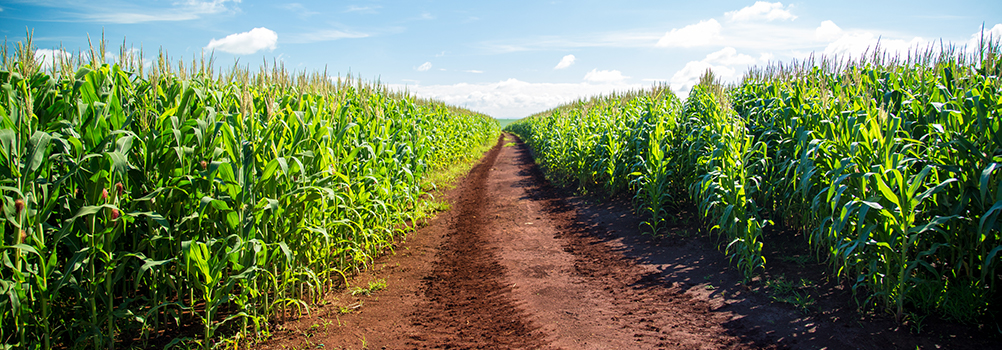
TOPIC 1: Soil workability and humidity monitoring
Challenge:
For machines to be able to enter a field to do work, they need to find ground which is strong enough to support their weight. Understanding the soil humidity after rain will help to predict the possibility of conducting work in the fields, which enables better planting, application and harvest and reduces the cost of machinery and the environmental impact.
Requirements:
EU coverage.
Resources provided by DEMETER:
Technical details for integration
Expected outcome:
Increase the precision of soil humidity leading to:
- Improving uptime for machinery.
- Minimising soil compaction.
- Improving efficiency of pesticide and nutrient application.

TOPIC 2: Interoperable Geo Tagged Photo APP
Challenge:
Farmers provide information to public administration services for several reasons. For example, Paying Agencies dealing with CAP funds request information from farmers in order to pay subsidies. However, CAP post 2020 forces paying agencies to monitor the entire territory for agro-environmental and CAP performance checks where Sentinel images are not enough. All EU Member States will then request that farmers send specific geo-tagged photos with specific metadata, including small parcels, or crops difficult to identify by satellite images.
In order to facilitate information provision from farmers to FMIS or Paying Agencies, a geo tagged photo app is needed using a common open AI interface based on REST protocol to demonstrate DEMETER interoperability enabler for FMIS. This GeoTagged APP should interoperate with DEMETER FieldBook, FMIS interfaces, IACS post 2020 deployed in EU Member States using same REST Open API defined in DEMETER.
Requirements:
- Technology readiness level: 7 or higher.
- Source code availability: Open source.
- Standards: API REST.
- Programming language: Android, IOS, or multi mobile Platforms (Cordova, Xamarin).
- Security: Considering GDPR and authentication mechanisms.
- Minimum geographical coverage: Spain and Ireland.
- Other: Infographics, without specific language menus (to be used by farmers all over Europe).
Resources provided by DEMETER:
- Webinar about DEMETER Architecture and FMIS Framework
- Webinar about farmers’ needs and Data Sharing Legal Requirements
- SW Component definition with harmonized API description for REST
Expected outcome:
The geo-tagged photos app will facilitate the shorter delivery information time requested by public administration and increase the content and quality of data for DSS in FMIS.
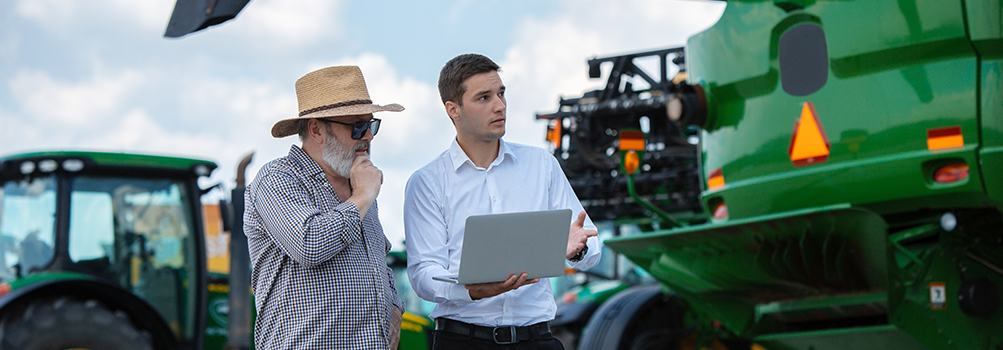
TOPIC 3: ISOBUS enabler
Challenge:
Interoperability is one of the key challenges in agriculture, where the interconnection between heterogeneous hardware and software systems plays a key role. Collecting data about machinery and integrating it with farmers’ systems is difficult as farmers use machinery from different vendors, with their internal systems coming from another vendor (or multiple vendors covering different processes). The goal is to enable different protocols and standards in the agri-food domain to talk to each other by enabling machinery to interoperate with other machines and platforms. This would be possible if existing state of the art protocols for machinery (ISOBUS protocol stack) are analysed and appropriate software mapping mechanisms developed to enable collection and communication over ISOBUS protocol stack.
The proposed technology will enable interoperability between different agriculture hardware, tools, and systems without any deep knowledge about the ISOBUS protocol.
Requirements:
- Technology readiness level: 6 or higher.
- Source code availability: Open source.
- Standards: ISOBUS stack:
-ISO 11783-3: Data Link Layer with PGN handling
-ISO 11783-5: Network Management with any amount of working sets
-ISO 11783-6: UT Working Set with AUX-N, Multilanguage and multi mask support
-ISO 11783-7: Application Layer with the data-handling
-ISO 11783-10: Task controller client (TC-BAS, TC-GEO and TC-SC)
-ISO 11783-12: Diagnostic Services with Level-1 data
-ISO 11783-13: File Server client - Programming language: .NET, JAVA.
- Data management: ISO 11783-10 ISOXML Tag.
- Intellectual property rights: General Public License (GPL).
- Other: Experience in the transport domain, software development (API, edge).
Resources provided by DEMETER:
- Webinar about DEMETER Architecture.
- Technical support and infrastructure access.
- In-site evaluation in one pilot during 2nd Sprint stage.
- Mentoring from the DEMETER team.
Expected outcome:
A gateway software component that implements ISOBUS protocol to cover both technical interoperability defining integration of hardware and software, and semantic interoperability by ensuring that standardised data formats are supported. The proposed technology will deliver enable interoperability between different agriculture equipment and systems. This will also deliver improved communication efficiency for legacy machinery.
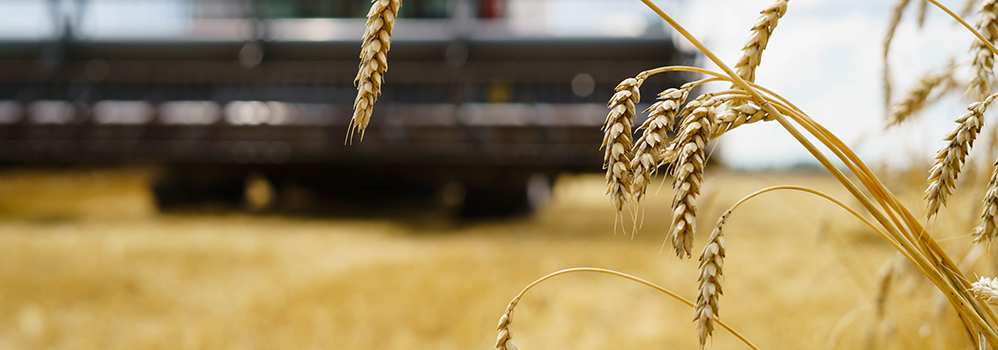
TOPIC 4: Blockchain-based solutions for agricultural applications
Challenge:
The need for traceability in the agriculture domain is well-known and it could be applied in numerous scenarios from simple supply chain monitoring, procurement tracking, crop and food production, insurance, to land registration and payment of services. The main challenge of the existing blockchain-based implementations is that they still suffer from traditional challenges such as a lack of or poor infrastructure, failures of interoperability, and what is most important the ability to easily integrate in an existing farmer system. Blockchain offers independently verifiable data storage and processing capabilities, perfectly suited to multi-stakeholder environments without centralised control/power over the system. The interoperability and traceability challenge should be addressed by providing the high TRL Systematic traceability blockchain component, which is already well tested and used in commercial services. The component should implement DEMETER defined semantic model, documented step-by-step integration manual and expose service online which in few steps could lead to integration of the component with any agri-food vertical.
Requirements:
- Technology readiness level: 6 or higher.
- Source code availability: Open Source blockchain platform.
- Standards: Standards for document creation and management, electronic signature etc. (PaDES/XaDES/eIDAS etc..).
- Programming language: Open API required, along with Software Development.
- Kits / Libraries for at least 3 of the most popular programming languages: JavaScript, Python, C#, Java, React, Angular, Swift.
- Security: Banking-grade.
- Geographical: Based in Europe.
- Data management: Built-in data storage and querying features, without
requirement for translation/middleware layer. - Intellectual property rights: Open source.
- Other: REST API interfaces. Possibility to deploy private blockchain if needed, with no scalability issues.
Resources provided by DEMETER:
- Webinar about DEMETER Architecture.
- Technical support and infrastructure access.
- Mentoring from the DEMETER team.
Expected outcome:
At least 1 functional prototype of a blockchain-based solution for agricultural applications developed (traceability, commodity trading, machinery/vehicles/equipment management).
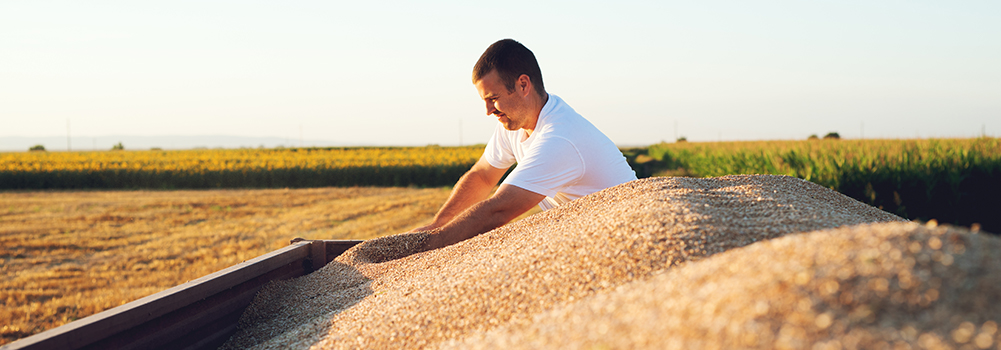
TOPIC 5: DEMETER Business process integration (BPM)
Challenge:
Farm management implies using a range of data sources and creating actions based on the analysis of the collected data. A coherent and streamlined creation of actions and monitoring of their execution is of great importance to medium size and large agriculture companies to ensure efficient utilization of the work force and the company assets, while contributing positively to the overall success of the company.
The application of BPM (Business Process Management) in agriculture helps in separating the logical layer from the technical implementation (i.e. the process modelling and the software application development) which will ensure efficient sharing of data between business processes in real time with business processes integration. This integration allows setting a basis for planning each step of production process, optimal usage of all resources, defining work orders, defining products shipping plan, setting a marketing budget etc. Data are in many cases used as triggers for the next production process thus providing fluently the activities workflow. Interoperability needs to be ensured in a workflow, that will be defined as a sequence of activities (and transactions) that must be performed; the actors responsible for specific activities; data that have to be sent, received and shared (between actors and/or workflows); and the format to use for the messaging.
Requirements:
- Technology readiness level: 6 or higher.
- Standards: REST interfaces, Data integrations standards.
- Programming language: Java, Python, .NET. or other widely used languages could be used.
- Data management: NGSI-LD.
- Intellectual property rights: GPL licence is most welcomed to boost the usage of the component, but other proprietary licenses could be also proposed.
Resources provided by DEMETER:
- Webinar about DEMETER Architeture.
- Access to pilot site.
- Technical details for business integration.
Expected outcome:
The integration of business process will result in
- Improved workforce utilisation.
- Improved operation efficiency.
- Resource usage optimisation.
Eligibility and Application
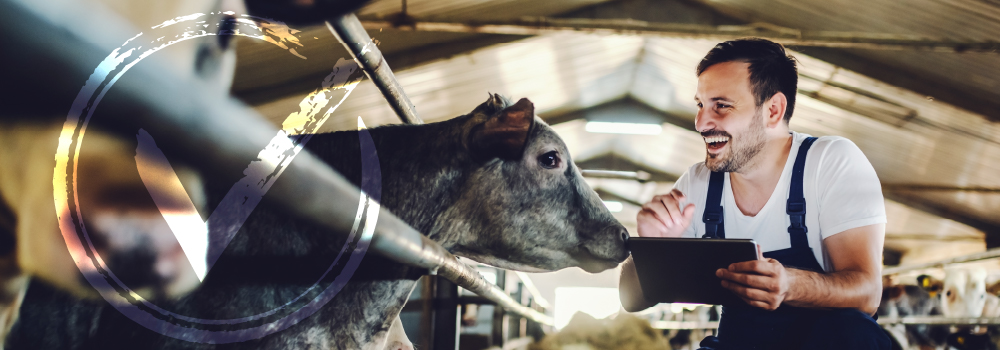
Eligibility Criteria
The target audience of DEMETER Open Call #1 – DEVELOP are SMEs who are legally established in an EU Member State, H2020 associated countries or Overseas Countries and Territories (OCT) linked to the Member States.
How to apply?
DEMETER Open Calls will be handled using the F6S platform.
Applications can be made here:
Applications are now closed.
Timeline
Submission to the DEMETER Open Call #1 – DEVELOP opened on the 16th of September 2020 and closed on the 18th of November 2020 (17.00 CET). Dates for the different phases are outlined below but may be subject to change if any modifications in the project’s schedule occur.



Resources & Downloads
Useful Information
This section contains information regarding the objectives of the DEMETER project and the relevant reference architecture.
-
-
- DEMETER Overview
- DEMETER Reference Architecture Overview
- Implementing the DEMETER Reference Architecture
- DEMETER Deliverable 2.1 – Common data models and semantic interoperability mechanisms
- DEMETER Deliverable 3.1 – DEMETER Reference Architecture
- H2020 Agri tech Research in Europe Webinar (Relevant information is available from
00:07:13 to 00:41:30)
-
Download our Open Call Brochure
This brochure details the DEMETER Open Call #1 – DEVELOP which aims to attract and engage startups/SMEs with technology products that can be implemented within the agro-business sector. The open call topics and the application process are outlined.
Download our Open Call Postcard
This postcard briefly outlines the DEMETER Open Call #1 – DEVELOP and the topics to be addressed.
Download our Flyer
This flyer details the DEMETER Open Call #1 – DEVELOP which aims to attract and engage startups/SMEs with technology products that can be implemented within the agro-business sector.
Webinars
The first Open Call webinar took place on the 7th October and was moderated by Nuria De Lama of ATOS and DEMETER WP6 Leader.
Speakers and their presentations are outlined below:
The second Open Call webinar took place on the 5th November and was moderated by Nuria De Lama of ATOS and DEMETER WP6 Leader.
Speakers and their presentations are outlined below:
- DEMETER Overview – Kevin Doolin, Project Coordinator
- Open Call application process, Miguel Goncalves, Open Call Manager
- Demeter Open Call Topics – Nenad Gligoric DNET
- DEMETER Reference Architecture – Yannis Oikonomidis INTRASOFT
For any questions, please contact opencalls@h2020-demeter.eu
Frequently Asked Questions
Find the answers to our most commonly asked questions
About DEMETER Open Call #1
What is DEMETER?
The DEMETER Project is a large-scale deployment of farmer centric interoperable smart farming-IoT based platforms delivered through a series of 20 pilots across 18 countries (15 States in the EU). Involving 60 partners, DEMETER adopts a multi-actor approach across the value chain (demand and supply), with 25 deployment sites, 6,000 farmers and over 38,000 devices and sensors being deployed and participants involved come from different production sectors (dairy, meat, vegetables, fruit and arable crops), production systems (conventional and organic) and different farm sizes and types, optimising the data analysis obtained across multiple farms.
What is Open Call #1 – DEVELOP?
The DEMETER Open Call #1 – DEVELOP aims to attract and engage Startups/ SMEs with technology products that can be implemented within the Agro-business. DEMETER will fund the activities of integration and interoperability of those technology solutions, and improvement of their innovation level. Such solutions will enlarge and enrich the pool of technology offers/ options of DEMETER towards the co-creation of particular solutions to overcome end-users needs and challenges.
What are the main Open Call characteristics?
The financial support provided within the Open Call #1 – DEVELOP, addresses individual SMEs aiming to integrate their technologies within DEMETER ecosystem as shown in the next table.
| Open call timeframe | From the 16th of September 2020 to the 18th of November 2020, at 17:00 CET |
| DEVELOP Activities to be funded | Reshape SME technology in order to integrate and make it interoperable with DEMETER platform. |
| Duration of activities | 6 months for development and integration activities 19 months of service maintenance activities Total: 25 months |
| Budget per project | Up to €30.000 (lump sum) per SME |
| Milestones / payments | Sprints of 2-months with evaluation of sprint results. Payments are associated with respective results and divided by 30% + 30% + 40% (lumpsum base, based on deliverables and outcomes). |
| Evaluation | Meeting with DEMETER assigned person (depending on the technology expertise required to evaluate results) at the end of each sprint. |
| Number of SMEs to be selected | Around 8 to 12 |
How can DEMETER help me?
DEMETER can empower you to develop and implement interoperable technology solutions in the agri-food field through a 6-month programme, where experts in diverse fields will provide training support, access to top infrastructure, €30k equity-free funding, visibility and the opportunity to work with the most innovative European agri-food stakeholders.
So, are you financing my initiative?
Your project could be financed if you are selected in the DEMETER call. Conditions are found in the Guidelines for Applicants. A selected project could be funded up to €30k.
How does DEMETER work?
After the open call for proposals, the selected projects/SMEs will join the programme comprising 3-sprints of 2 month each. They will have defined milestones and deliverables in their submitted proposals. These are the basis for monitoring and evaluating their work progress during the execution of the DEVELOP activities. The milestones and deliverables will be evaluated at the end of each sprint.
What kind of projects are you looking for?
The DEMETER Open Call #1 – DEVELOP aims to attract and engage startups/SMEs with technology products that can be implemented within the Agro-business. More specifically, DEMETER will support projects addressing the following topics/challenges:
- Soil workability and humidity monitoring
- Interoperable Geo Tagged Photo APP
- ISOBUS enabler
- Blockchain-based solutions for agricultural applications
- DEMETER Business process integration (BPM)
The topics/challenges are separate from one another. Each submitted application must address only one topic.
More information about each topic/challenge is available on the Guidelines for Applicants.
Where does the funding come from?
Funding is given by the DEMETER consortium under a Sub-Grantee Agreement signed by the selected proposers and DEMETER consortium. The funds are given by the European Commission (Horizon 2020 Framework Programme), which uses DEMETER as intermediary.
Is there any support for applicants without a selected idea?
No. Only the selected beneficiaries will be benefiting from DEMETER Open Call #1 – DEVELOP services.
What if I secure funds from other national or regional authorities for the same project?
The funds of the project come from the H2020 Programme. This means its regulation will apply to the funds. If you get additional public funding from other entities it will be your responsibility to assure the compatibleness of the different sources of funding.
How does the funding mechanism work?
The aid provided is relying on a cascade-funding scheme involving H2020 funds. The scheme is based on a Grant Agreement signed by the European Commission and the DEMETER Consortium partners. The Consortium partners as such receive the H2020 funds which are then transferred to the winners of our open calls based on the rules and regulations explained in the Guidelines for Applicants available at our website. This means that funds that will be received by the call winners are H2020 funds.
Due to BREXIT, is there any effect for legal entities and natural persons legally established in UK to be able to apply to DEMETER?
Under the Withdrawal Agreement, the UK will continue to participate in programmes funded under the current 2014-2020 Multiannual Financial Framework (MFF) until their closure.
Meaning, UK participants are eligible for funding under the DEMETER Open Call #1 – DEVELOP.
How large is your fund?
DEMETER will distribute a total amount of €300k in the Open Call #1 – DEVELOP.
How to participate
Who is eligible for the Open Call?
The target audience of this call are SMEs. An SME will be considered as such if complying with the European Commission Recommendation 2003/361/EC2[1] and the SME user guide[2].
Only SMEs legally established in any of the following countries (hereafter collectively identified as the “Eligible Countries”) are eligible:
- The Member States (MS) of the European Union (EU), including their outermost regions;
- The Overseas Countries and Territories (OCT) linked to the Member States[3];
- H2020 associated countries (those which signed an agreement with the Union as identified in Article 7 of the Horizon 2020 Regulation): according to the updated list published by the EC[4];
The UK applicants are eligible under the conditions set by the EC for H2020 participation at the time of the deadline of the call.
See Guidelines for applicants for more eligibility criteria details.
[1] European Commission Recommendation 2003/361/EC. http://eurlex.europa.eu/LexUriServ/LexUriServ.do?uri=OJ:L:2003:124:0036:0041:en:PDF
[2] SME definition: Please check “User guide to the SME definition” available at https://op.europa.eu/s/n3t1
[3] Entities from Overseas Countries and Territories (OCT) are eligible for funding under the same conditions as entities from the Member States to which the OCT in question is linked.
[4] https://ec.europa.eu/research/participants/data/ref/h2020/grants_manual/hi/3cpart/h2020-hi-list-ac_en.pdf
What are your funding criteria?
Every eligible proposal will be evaluated by two different experts. The evaluation criteria are:
- Excellence & innovation (40% weighting)
- Expertise and excellence of the proposed team (30% weighting)
- Project planning and value for money (30% weighting)
What information is required for the application?
The documents that will be submitted are:
- Application form: administrative questions to be completed directly in the F6S platform. In addition, some general questions for statistic purpose and tick boxes to be clicked by the third parties confirming they have read the conditions and agree with the conditions defined in the Guidelines for Applicants.
- Proposal description: document in PDF format containing the description of the project. It will include different sections: (1) Overview of the proposal, (2) Excellence/Innovation, (3) Expertise and Excellence of the proposed team, (4) Project Planning and value for money.
- Honour Declaration: which declares that all conditions related to the DEMETER Open Call #1 – DEVELOP are accepted by an SME legal representative.
- SME Declaration: which evaluates the status of the participating SME.
When is the deadline to apply?
18 November 2020 at 17.00 CEST. You can find of our open application deadlines on our Apply page
Can I have access to my application answers?
You should be able to view and access all your applications on F6S. If you run into any issues accessing your applications or account, please contact support@F6S.com
What if I need to change the answers to my application?
If you have submitted an application and would like to change or update any information please email F6S (support@f6s.com). Let them know what you would like to change along with the name of your project on your application.
When will I hear back regarding my application?
After applications close, we’ll review applications for about 8 weeks, and spend time getting to know even more about your team, project, progress and idea. Our goal is to notify applicants within 8 weeks from the application closing date.
Selected participants
When are we going to be paid?
Payments will be done in 3 instalments (30% + 30% + 40%) based on concrete results, deliverables and review of each sprint.
Summary of funding:
| DEVELOP Phase | Duration | Funding | Example (€30k) |
| Sprint #1 | 2-months | 30% | €9.000 |
| Sprint #2 | 2-months | 30% | €9.000 |
| Sprint #3 | 2-months | 40% | €12.000 |
Detailed payment schedule and payment conditions will be settled in the Sub-grant Agreement.
Do I have to keep track of my expenses for justifying the costs?
Payments will be done based on concrete results and not administrative justifications.
Is subcontracting allowed?
Subcontracting is not encouraged. The general rule applicable to DEMETER project is that beneficiaries must have the appropriate resources to implement the full set of tasks needed within the project. This means it is not allowed to subcontract key parts of the project.
Is physical presence needed at any time for the applicants?
Each SME should be available to participate in one face to face activity in Europe during one of the 3 sprints.
Other questions, comments, or concerns?
Didn’t find the answer you were looking for?
Ask us your question on the Online Q&A: https://www.f6s.com/demeterh2020/discuss
For extraordinal communication need, please contact the Help Desk: opencalls@h2020-demeter.eu and we’ll get back to you shortly!
Questions following Webinar
How does the output need to be connected to the DEMETER Platform?
The funding project should result with the components or services that to some extent relies, is integrated or use DEMETER platform. There is no direct answer as this will depend on the topic, some components will be functional building blocks of the platform, meaning that not only integration but also interoperability with other services is necessary; and other will require integration with the farmers’ management system which is connected to DEMETER, etc.
For topic 1, is there a minimum TLR? Is there any advantage to being at a higher TLR?
In general higher TRLs will contribute to a better score in the Excellence & innovation criterion.
Topic 1- It is not clear for us what data will feed our prediction system. Will you provide to use data from sensors of humidity or satellite data? What is going to be the pilot to be tested?
The origin of data is of minor importance. So, both satellites as well as on earth sensors. Of course, also UAVs (e.g. in H2020 project MISTRALE) could be a source, too. It shall be shown that data can be merged to information which are basis for decision (support) services.
One of the requirements of Topic #2 is that the source code availability should be open source. Is this a requirement that must be accomplished by submission deadline?
No, open source should be accomplished during the project duration, not by the submission deadline.
Another requirement for Topic #2 is that technology readiness level should be 7 or higher, does this mean that the existing app should be published into any market (Google or Apple or both) by submission deadline?
Publishing the application to Google Play or Apple Store will ensure that TRL 7 is achieved, but it means that TRL7 or higher is expected to be established by the end of the project, not by submission deadline. High TRL is encouraged before submission deadline and it will be better scored on the evaluation.
Topic 3- The Isobus how will communicate with the main controller of the FMIS? Can you provide us with some information how the ISOBUS will be connected in your architecture? The interoperability of ISOBUS with what services or hardware tools shall be compatible?"
Developed component should provide REST interface, and it should be integrated with the DEMETER DEH (Digital Enabler Hub). ISOBUS is standardised set of protocol stack already working with a number of machinery.
Topic-2 would have to be open source. Is this for the 6 month period? Any further development and enhancement after the 6 months would not to be open source any longer?
The goal of the open call is to boost European competence in the agrifood sector by providing different open source interoperability tools, services and applications. The applicant would need to ensure that the open source will be achievable after the project lifetime.
Can the application be from a consortium or an applicant should be one entity with subcontracting certain elements to another party?
According to section 2.2 of the guidelines for applicants, the Open Call #1 – DEVELOP, addresses individual SMEs aiming to integrate their technologies within DEMETER ecosystem, not consortia.
Subcontracting is not encouraged. The general rule applicable to DEMETER project is that beneficiaries must have the appropriate resources to implement the full set of tasks needed within the project. This means it is not allowed to subcontract key parts of the project. If subcontracting is needed, it should be duly justified in the proposal.
Topic 5 Do we need to deliver a software? It is more about people's thinking change than machine related innovation. If yes, how detailed should the software be and what are the communication objectives?
This topic outcome should result with the software component. We did not specifically highlighted the scenario that needs to be developed, thus it would not be possible to answer how much software should be detailed but it must be in scope of the work and the budget.
Our company’s shareholders are two companies and an individual. None of the parties own => 50%. Are we eligible or are we not 'independent'?
This information may not be sufficient to decide on the eligibility of the SME. According to section 3.1.1 of the guidelines for applicants, SMEs must confirm their compliance with the European Commission Recommendation 2003/361/EC2 and the SME user guide.
Can US based agro startup take part in Open Call?
According to section 3.2 of the guidelines for applicants, no.
Every SME under the definition of the EU commission is allowed to apply regardless the sector of activity?
The SME sector of activity itself is not an eligibility criterion.


